|
This edition of Thule newsletter has lighter theme, if war can be called a light theme that is. Many of us like every now and then relax from studying the past, but would still love to have something to do with Roman things. Computer gaming is one alternative, and this newsletter concentrates on that part of Roman activities. Over the years there has been numerous strategy games about ancient warfare and civilizations. Currently at the market there are two games which are worth to explore if you are interested in Roman warfare in real time strategy / tactic genre: Rome Total War and Legion Arena.
- Rome Total War
In Rome Total War you'll lead one of the three Roman factions centered upon famous families of Brutus, Iulius and Scipio. Each of the families, or clans if you like, has it's strenghts and weaknesses and also different area of operations in the beginning. For example the family of Iulius', that is Iulii, has first to meet the Gauls in North, while Scipii have the Carthage to overcome.
- Family tree.
Each faction has faction leader and family tree from where to drawn new generals and administrators. Each male member of family has his set of skills which develop during the game play. For example a succesful general recieves skill points which make him better leader in the battle and family members with administrative duties in the cities receive skill points in administration which will make the cities they administer to be more peaceful and to bring more money for your faction's treasury.
Each turn takes half a year and your family members grow, age, marry, have children and eventually die for old age unless they fall in battle. You can also recruit new family members by adoption, but that's expensive.
Cities without administrators and armies without commanders don't perform too well, so you'll need to take care of your family and sometimes scale your operations according to available family member resources. This brings a lot of realism into Rome Total War. Family was important to Romans, and as said each individual is different which also adds variation to the gameplay.
- Money.
Every turn each of your cities brings you certain amount of money from which you'll need to finance building of new cities, recruiting and upkeeping your army and some other things you'll do during the turn. It's important to keep your faction financies in order. Your cities for example bring more profits if they have good trade connections, and that means that you'll need to have trade treaties with other factions. This also adds realism to the game, you probably don't want to declare war with your biggiest trading partners.
- Units and technology.
The game has lot's of different units. New units are being introduced when you build more advanced garrisons and armament factories. Some new units also come available during gameplay when years go by. There's no way to have effect on technology advances. That can be surprising for those of us who have used to strategy games like Civilization or Hearts of Iron, in which controlling the scientific research are one of the most important aspects of winning strategy.
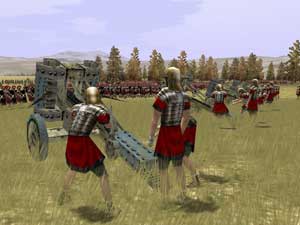 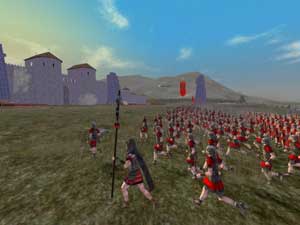 But actually, and this is subjective opinion, I think that the solution Rome Total War offers, works better in ancient environment. It's impossible for you to have best units in the beginning of the game since you'll don't have money to build all city extensions to create better units, and even if you would have, your cities cannot build unlimited amount of troops, so you'll need to have many centers of military production, which bring costs really high and it takes time to get your empire into position to build best units. This eliminates unhistorical technology advances and gives you possibility to concentrate into more pressing matters.
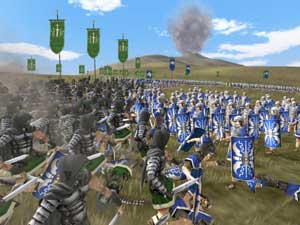 The units are quite well balances and quite historically correct. It has always been hot question about games about history and other entertainment products about history, that what is their level of historical accuracy. As a historian I have a little different perspective to this matter than what you might expect. For me historical accuracy is not a must since I respect every piece of entertainment products as being one interpretation of history. After all every history book is also an interpretation, after certain level objectivity becomes a myth and words "historically correct" are simply a interpretation, a representation. What I see as central in historical correctness is feasibility. If making battles balanced one needs to have some features of Spartan phalanx to be disregarded, then isn't it worth it?
However I see it not practical to scrap details or to include unhistorical units just for fun of it. In Rome Total War I have seen best balance of historical details and smooth gameplay in strategy games ever, excluding Hearts of Iron which is of different genre. Also some of the inaccuracies there are can be overcome easily: just don't use them. For example burning pigs doesn't need to be used in large scale in battles.
- Cities and improvements.
What comes to units and technology comes also to the cities and their improvements. To make your cities great you can build all sorts of military and civilian improvements. To keep your cities calm you can build temples. To entice trade you can build paved roads, harbours and so on. Small cities cannot build certain improvements, so in order to build better garrisons your city needs to be big enough. This also adds to the realism and further eliminates the need for technology advances.
Those who have played games like Civilization or Europa Universalis or such, it might be a bit of disappointment that there aren't as many city improvements to build, but again balance is fine with overall gameplay. As long as you keep in mind that this game is not an ancient city building simulation, everything is fine.
- The game itself.
As said, the game advances in turns. At each turn you'll have in the beginning reporting phase, where different information comes in: faction announcements (marriages, deaths, child-births, comings of age etc.), events with other factions (e.g. Iulii declare war to Gauls), built buildings in your cities, units recruited, Senate missions recieved etc. I usually read all the reports before making new decisions.
After reading reports there can be units moved, battles fought, new building projects or recruitment started in the cities, and making all other strategic level decisions. It's often that you'll have couple of battles per turn and you'll need to create new units and move your old ones into position for battles. This is what Rome Total War is all about: war. Every other aspect of the game serves the goal of waging war in Roman environment. This is logical solution for problem that many games which include only scenarios offer, that is the problem of storyline of the game. For example in Close Combat III no matter how well you handled the blitzkrieg part of the war when playing the Germans, you did fall in Moscow because the game storyline demanded it.
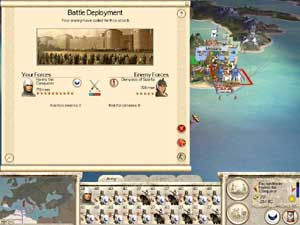 In Rome Total War the solution is simple: you'll create the storyline of each game and work within the framework of ancient history. This means that the end of game is always different, however usually you end up conquering the Mediterranean world, but that's the idea. However this means that you cannot play Rome Total War as you can play game like Civilization, that is peacefully. In the end the strategic level is not full enough to make it interesting to play only as strategy game.
The strategical decisions are done in map mode where you have scrollable map of Europe and Mediterranean area. At this map you can move your units certain lengths of passages at every turn, visit your cities to make decisions of them (you can also set cities to be auto managed if you like). The map is quite beautiful and even changes by the time of year. Map is made of provinces each with it's metropolis, in this respect it reminds of Hadrianc period organization of Roman empire.
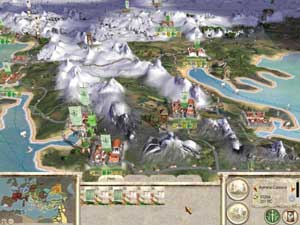 This strategical level is only one half (more important or less important depending of individual appreciations) of the gameplay however. The other half is tactical one where you are given a control of each individual battle. When battle begins, you can choose to lead it yourself or let it be automatically solved. When you lead it yourself, you'll at first need to place your troops to the battle map. The area where you can place your troops varies according to the situation. The basic settings for battle are: you are defdending a city, you are attacking against a city or you fight against enemy in open plane. When attacking city it's important to have rams, ladders or other war machines to break city walls or gates to get into the city.
At the heart of tactical level is the placement of your troops, just like in the ancient warfare it should be. Also terrain plays an important role. After you have placed your troops into right formation, you can begin the battle. You can give orders during the battle for individual units, but you cannot break up units or command single soldiers. During the battle important role is given to battle morale, your soldiers can be brave, but they aren't suicidal. When they panic they quite often run off from the battle totally, so you'll need to make sure during the battle to give good orders to them to keep them operational.
Battles are fought in real-time 3D environment where you can zoom and move camera in the battlefield. The graphics of the game are wonderful in this respect. I have included lot's of screenshots with this article since it's difficult to believe it otherwise. If you are interested real-time strategy and Roman things, Rome Total War gives you no disappointment in this side.
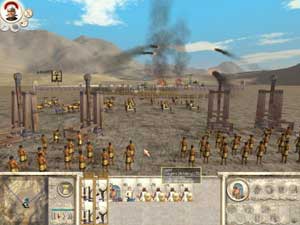 However there is one major drawback, at least for me it was such. I was very disappointed with the control of the battle. To have battle fought victoriously you'll need quite lot of practise and you need to hit pause key after every 5 seconds or so to see different parts of the battlefield properly for making decisions. This makes it sometimes very hard work actually fighting the battles. By no means they are impossible to be won, but it's too easy to say oneself that one can take a little more casualties just to have the whole battle to end at reasonable time, otherwise each battle can take a lot of time to play, and if you have several unimportant battles during one turn, there is at least for me great temptation to auto solve them and not play them by myself.
The user interface is fine throughout the game, sometimes it takes a little a practise to remember which mouse-button you need to click each time, but that's probably a problem for me because for years I have used to use Macintosh's single button mouse, but in the Windows side of computing people are generally used to use two or more buttons in their mouse, and for them it shouldn't be a great problem. The user interface sometimes requires a lot of clicking to get you to the place you want to, but it's also very compact and doesn't take too much space from the screen.
- Overall impression.
Rome Total War is very addictive game, it's difficult to stop playing it since you always want to see what next turn brings, and after reading reports, you want to take some decisions, and then the next turn... Game is easy to learn to play, except learning right battle tactics, but those are after all the the more important half for most, and being complicated also means being flexible and offering many challenges. After you have played imperial campaign once you probably don't want to play it again too many times, but historical scenarios that come with the game make up for next playing round. For a occasional gamer like myself the game offered about a year worth of challenge, and fighting custom battles hasn't lost it's magic still.
One reason for this addictiviness and interest for the game are the superb graphics. Of course everything can be done better always, but there really are very few flaws in the graphics and animations. Sound effects are not so special, but totally adequate for enjoyable gaming experience.
At historical side the game offers reasonable and actually quite interesting balance between playability and historically accurateness. It's not a simulation, it's not education but it's an excllent entertainment product.
- Legion Arena
The second game I haven't palyed nearly as much, but I wished to include it here since it offers different perspective for the Roman real-time strategy genre.
Legion Arena is straightforward tactical real-time strategy game. You don't have any stratgic level decisions to make, instead you fight one battle after another and storyline of the game goes with Caesar's Gallic wars at first. You are sent by Caesar to do battles here and there. After each battle you can re-train and re-equip your men as well as recruit new units. Battles are fought in similar 3D environment as in the Rome Total War.
The most notable difference between the games is obviously lacking of strategic mode in Legion Arena, for some this undoutably will be relief, for others it'll be important feature lacking. This might lead to think that if you detest battles in Rome Total War, Legion Arena wouldn't be very interesting for you. However there is a but. The tactical level is better done in Legion Arena. Before battle begins you have much clearer way to take tactical decisions. There's also added realism in the way commands can be given during the battle.
In Rome Total War, you don't have any choices to make your battle plan known to your men. In Legion Arena good battle plan makes usually the difference between winning in Roman style, i.e. overwhealmingly and barely winning. During the battle in Rome Total War you can give orders almost unlimitedly and your men will try to follow them unless it's impossible. In Rome Total War the artificial intelligence is also more complicated. In Legion Arena however the battle plan is followed, and your duty is to make minor arrangements to it and solve unexpected crises. You can give only certain amount of orders and your units do not react that quickly. This makes fighting battles a bit harder as tactical challenge in Legion Arena, but it also makes it less frustrating to play for someone who has familiarised himself into Roman warfare.
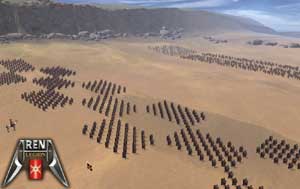 The graphics in Legion Arena are nowhere near to those in Rome Total War. That's unfortunate, since they could be much better. For me the 3D graphics always look clumsy, so it's not so much about them, but the overall feeling in the game graphics and user-interface is one of disorder and techie-likeness. It doesn't have the elegance of Rome Total War.
For me the lack of strategic level of decision was a big minus, I haven't developed any sort of addiction to Legion Arena, for me it's a series of battles, of course interesting ones, but still series of battles with minimal storyline. Also the poorer graphics make the game less enjoyable than Rome Total War. However I noticed that I enjoyed the tactical challenges Legion Arena offers. Playing it fulfilled the part of the expectations I couldn't satisfy with Rome Total War, that is to be able to simulate ancient warfare in realistic enough environment.
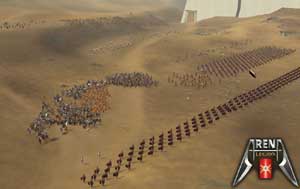 Both games are very playable, and as you might have guessed, my final verdict is that these two games are not exact rivals against each other, but rather complimentary since they address different needs. Both are also interesting for anyone interested in Roman warfare, but those who are more deeply interested the warfare should enjoy Legion Arena more. However those who expect more entertainment from their gaming experience, no doubt enjoy Rome Total War more as well do those who are more interested in strategic level decisions. Both products seem to have enthusiastic fans and Googling it, you can find lot's of more information about each game.
One last thing though... those of us who are Mac gamers, found Legion Arena the only option and that's why Legion Arena does get some sympathy points more from me. Whether you choose either of games, I think you will enjoy them, or maybe you do like I did, that is to get both games. Have nice moments while playing Roman-themed games, but do remember to enjoy the Summer, which is way too short on these Northern areas of us!
- Article by: Gaius Curius Saturninus
|